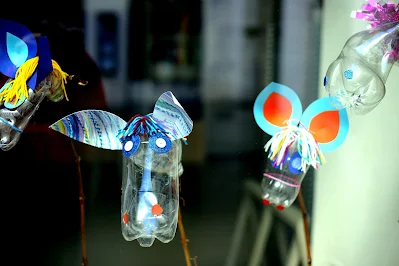Plastics, once hailed
as revolutionary materials, have become synonymous with environmental
degradation. As our planet grapples with the repercussions of plastic
pollution, there seems to be a glimmer of hope on the horizon. In this article,
we delve into the multifaceted aspects of the fight against plastics pollution,
from governmental initiatives to grassroots movements, and explore whether we
are witnessing the dawn of a plastic-free era.
In recent years, the
detrimental effects of plastic on the environment have sparked a global
awakening. From clogged oceans to wildlife casualties, the urgency to address
plastic pollution is now more palpable than ever. As we stand at the crossroads
of change, it's essential to examine the various facets of this issue and the
collective efforts being made to reverse the damage.
Rising
Concerns
Mounting evidence
points to an alarming escalation in plastic pollution. The sheer volume of
single-use plastics and their persistence in the ecosystem pose threats to
marine life, terrestrial habitats, and even human health. The question looms:
Can we afford to turn a blind eye to the consequences of our plastic-dependent
lifestyles?
Governmental
Initiatives
Governments worldwide
are taking steps to mitigate plastic pollution. From outright bans on
single-use plastics to investing in recycling infrastructure, nations are
reevaluating their approach to plastic consumption. Countries like Sweden and
Canada are at the forefront, setting an example for the rest of the world to
follow.
Corporate
Responsibility
Acknowledging their
role in the crisis, many corporations are embracing sustainable practices.
Whether through the adoption of recyclable materials or redesigning packaging,
businesses are aligning their interests with environmental stewardship. This
shift in corporate ethos signals a promising trajectory for the fight against
plastic pollution.
Innovations
in Packaging
The packaging industry,
a major contributor to plastic waste, is undergoing a transformation.
Innovations such as mushroom-based packaging and edible packaging offer
eco-friendly alternatives. The challenge lies in scaling these solutions to
meet the demands of a global consumer market.
Consumer
Awareness
The power of consumer
choice cannot be understated. With increased awareness of the environmental
impact of plastics, consumers are demanding sustainable alternatives. Social
media platforms serve as catalysts, amplifying the voices advocating for a
plastic-free lifestyle.
Biodegradable
Plastics
Biodegradable plastics
present a potential solution, but they are not without controversy. Questions
surrounding their true biodegradability and the conditions required for
decomposition need careful consideration. Are these alternatives a panacea, or
do they come with their own set of challenges?
Circular
Economy
A circular economy,
where resources are reused and recycled, emerges as a promising model.
Communities embracing circularity showcase reductions in waste and a more
sustainable approach to production and consumption. Could this be the blueprint
for a plastic-free future?
Educational
Programs
Education plays a
pivotal role in effecting change. Schools, NGOs, and governments are investing
in programs that instill environmental consciousness. The hope is that a
well-informed generation will spearhead the transition to a plastic-free world.
Global
Collaborations
Addressing plastic
pollution necessitates international cooperation. Collaborative efforts between
nations, NGOs, and businesses are crucial for sharing knowledge, resources, and
technologies. The fight against plastic pollution transcends borders; it
requires a united front.
Technological
Solutions
Technology, ever the
ally of progress, offers solutions to manage plastic waste. From AI-powered
sorting systems to innovative recycling methods, technological advancements
show promise. Startups dedicated to tackling plastic pollution showcase the
dynamism of the tech industry in this space.
Legislation
and Policy Changes
Stringent regulations
are proving effective in curbing plastic production and consumption. Regions
with robust policies witness a reduction in plastic waste and an increase in
sustainable practices. The challenge lies in ensuring global adherence to such
policies.
Social
Movements
Grassroots movements
have played a pivotal role in raising awareness and pressuring governments and
corporations to act. The sheer power of collective action has led to policy
changes and a shift in societal attitudes toward plastic use.
Challenges
Ahead
While progress is
evident, challenges persist. Economic interests, lack of infrastructure, and
ingrained habits pose formidable obstacles. Tackling these challenges demands
innovation, perseverance, and a collective commitment to a plastic-free future.
As we navigate through
the complex landscape of plastic pollution, there is a sense of optimism.
Governments, businesses, and individuals are stepping up to the plate, each
contributing to a mosaic of change. The journey towards a plastic-free world is
arduous, but the collective will to reverse the damage bodes well for the
future.
Frequently
Asked Questions (FAQs)
Are
biodegradable plastics the ultimate solution to plastic pollution?
Biodegradable plastics
offer promise but come with challenges. Proper disposal and conditions for
decomposition must be met for them to be effective.
How
can individuals contribute to the fight against plastic pollution?
Individuals can make a
difference by choosing eco-friendly products, reducing single-use plastic
consumption, and supporting policies advocating for a plastic-free world.
What
role does technology play in managing plastic waste?
Technology aids in
sorting, recycling, and innovating alternative materials, contributing
significantly to the management of plastic waste.
How
can communities adopt a circular economy model to reduce plastic waste?
Communities can promote
recycling, reuse, and sustainable practices, fostering a circular economy that
minimizes waste and environmental impact.
What
challenges do governments face in implementing strict regulations on plastic
use?
Economic interests,
resistance from industries, and the need for effective infrastructure pose
challenges for governments enforcing strict regulations on plastic use.


